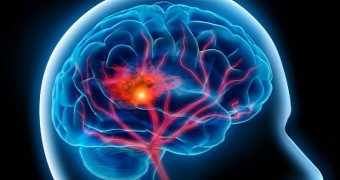A new study in the journal Annals of Medicine points the finger at a lab-made stimulant dubbed beta-methylphenethylamine (BMPEA) and blames it for a stroke that a perfectly healthy woman suffered in January 2014.
The woman, then 53-year-old, unknowingly consumed BMPEA when she took a dose of a sports supplement made by Swedish company MM Sports and marketed under the name of Jacked Power.
No, it's not that the woman didn't bother to read the label to see what was in the sports supplement. Rather, it looks like the list of ingredients for Jacked Power didn't say anything about BMPEA.
It wasn't until after she suffered the stroke and medical experts had a closer look at the sports supplement she took prior to this unfortunate event that is was revealed that Jacked Power contained the stimulant.
It took less than an hour for the woman's brain to start bleeding
According to the doctors who handled this case, the 53-year-old woman took her first dose of the Jacked Power sports supplement just before a workout session.
She only got to exercise for about 45 minutes before her left hand went numb. When the woman went to see a doctor, she was told that she had suffered a hemorrhagic stroke, i.e. a vessel had ruptured and leaked blood into her brain.
Luckily, the 53-year-old didn't experience any symptoms other than numbness in her left hand, and so doctors agreed to discharge her from hospital in just a few days.
The stimulant is the most likely culprit for the woman's stroke
Since the woman was in perfect health condition when she suddenly and without warning stroked, medical experts argue that the most likely culprit for the brain bleed is the sports supplement that she took just before her workout.
Thus, as mentioned, they point the finger at the BMPEA stimulant that was among the ingredients used to make the supplement but that was not mentioned on the label.
In their report in the journal Annals of Medicine, the specialists who investigated this case explain that BMPEA's chemical profile is similar to amphetamine. The thing is that, unlike amphetamine, not much is known about its effects on the body.
Studies on cats and dogs have shown that the compound can up heart rate and trigger an increase in blood pressure. Still, its effects on people are yet to be properly documented.
Health officials aren't exactly big fans of this stimulant
Traces of BMPEA have over the years been found in plenty of other supplements promising to promote weight loss and help folks bulk up. The trouble is that health officials don't really like this compound and don't want people taking it.
In fact, it was in April that the US Food and Drug Administration ordered five companies to remove this compound from the list of ingredients they use to make their products on the grounds that there was no evidence the stimulant was safe for human consumption.
Doctors too warn that taking this stimulant and other similar ones can cause serious health complications. “Untested stimulants can pose serious health risks to unsuspecting consumers,” specialist Pieter Cohen with the Harvard Medical School said in an interview, as cited by Medical Express.

 14 DAY TRIAL //
14 DAY TRIAL //